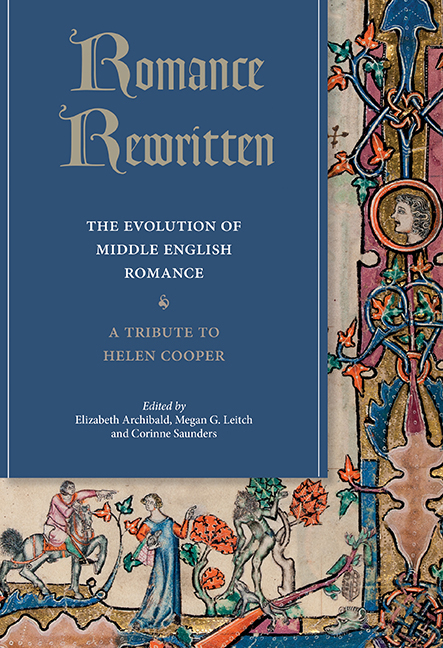Book contents
- Frontmatter
- Dedication
- Contents
- Notes on Contributors
- Acknowledgements
- Introduction. Middle English Romance: The Motifs and the Critics
- I Romance Disruptions
- II Romance and Narrative Strategies
- 4 Beginning with the Ending: Narrative Techniques and their Significance in Chaucer's Knight's Tale
- 5 The Riddle of ‘Apollonius’: ‘A Bok for King Richardes Sake’
- 6 Malory and the Post-Vulgate Cycle
- 7 Towards a Gestural Lexicon of Medieval English Romance
- III Romance and Spiritual Priorities
- IV Late Romance
- Works Cited
- Index
- Volumes Already Published
4 - Beginning with the Ending: Narrative Techniques and their Significance in Chaucer's Knight's Tale
from II - Romance and Narrative Strategies
Published online by Cambridge University Press: 17 October 2019
- Frontmatter
- Dedication
- Contents
- Notes on Contributors
- Acknowledgements
- Introduction. Middle English Romance: The Motifs and the Critics
- I Romance Disruptions
- II Romance and Narrative Strategies
- 4 Beginning with the Ending: Narrative Techniques and their Significance in Chaucer's Knight's Tale
- 5 The Riddle of ‘Apollonius’: ‘A Bok for King Richardes Sake’
- 6 Malory and the Post-Vulgate Cycle
- 7 Towards a Gestural Lexicon of Medieval English Romance
- III Romance and Spiritual Priorities
- IV Late Romance
- Works Cited
- Index
- Volumes Already Published
Summary
It seems to me that the heritage of great literature presents us with numerous highly detailed and profound examinations of what specific beliefs entail as well as remarkably rich descriptions of everyday life. Writers explore what it is to live with a particular conception of time, and what consequences, social, historical, and psychological, a commitment to specific temporalities may produce. By comparison, examples drawn from purely philosophical texts seem thin in their sense of human motivation and moral complexity. In this sense, I do not view literary works as applied or sugar-coated or unrigorous philosophy, but as a specific form of philosophic thought in the broad sense. They philosophize not with a hammer but with a feather. And it has always seemed to me that an important purpose of literary criticism is to help us recover the elusive wisdom of great writers who are also great and delicate thinkers.
(Gary Saul Morson)Chaucer's Knight's Tale begins with an account of Theseus, duke of Athens, returning home in triumph after his successful conquest of the Amazons and his marriage to their queen Hippolyta:
Whilom, as olde stories tellen us,
Ther was a duc that highte Theseus.
Of Atthenes he was lord and governour,
And in his time swich a conqueror
That gretter was ther noon under the sonne.
Ful many a riche contree hadde he wonne,
What with his wisdom and his chivalrye.
He conquered al the regne of Femenye,
That whilom was ycleped Scythia,
And weddede the queene Ypolita,
And broghte hir hoom with him in his contree
With muchel glorye and greet solempnitee,
And eek hir yonge suster Emelye.
And thus with victorye and with melodye
Lete I this noble duc to Atthenes ride,
And al his hoost in armes him biside.
And certes, if it nere to long to heere,
I wolde have toold yow fully the manere
How wonnen was the regne of Femenye
By Theseus and by his chivalrye,
And of the grete bataille for the nones
Bitwixen Atthenes and Amazones,
And how asseged was Ypolita,
The faire hardy queene of Scythia,
And of the feste that was at hir weddinge
And of the tempest at hir hom-cominge;
But al that thing I moot as now forbere. (859–85)
- Type
- Chapter
- Information
- Romance RewrittenThe Evolution of Middle English Romance. A Tribute to Helen Cooper, pp. 85 - 102Publisher: Boydell & BrewerPrint publication year: 2018



